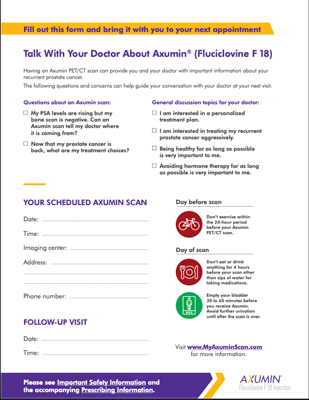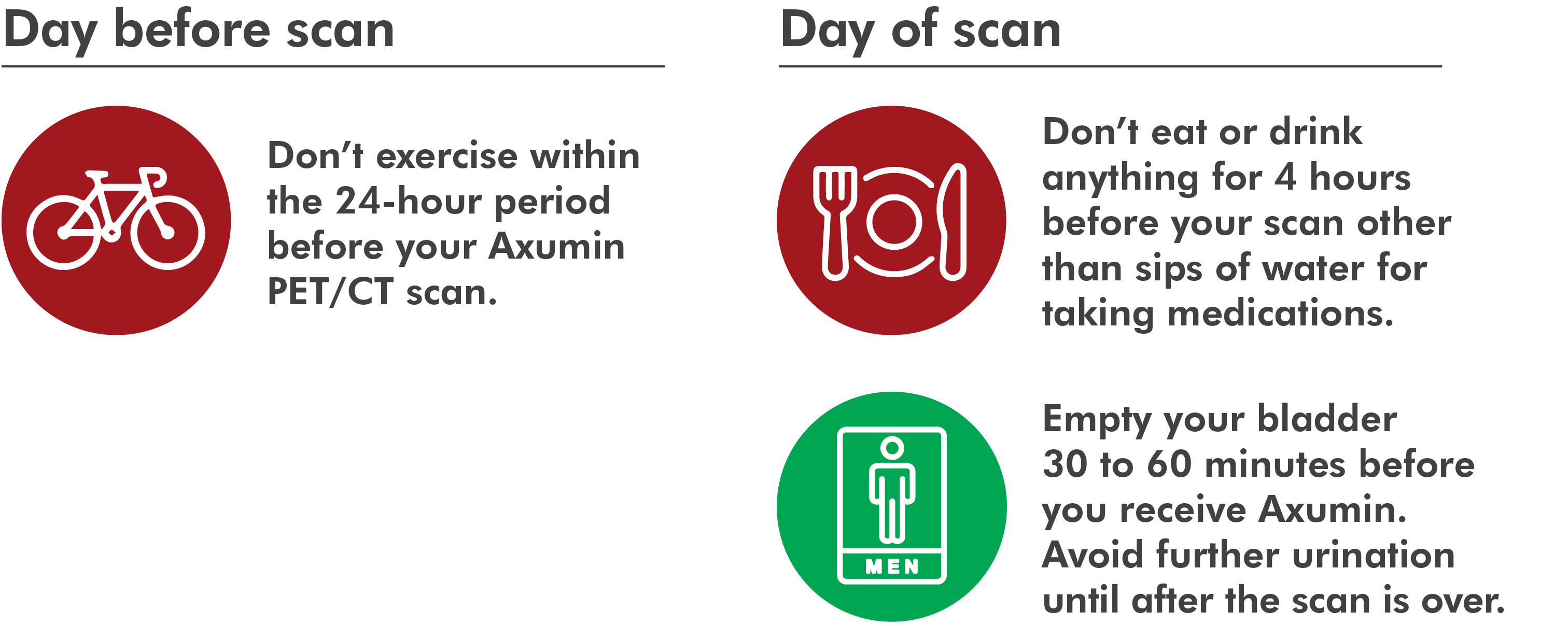Talking to my doctor
Making informed decisions through greater knowledge
Talking with your doctor can help you become your own best advocate
The more information your doctor has about your recurrent prostate cancer, the more personalized your treatment plan can be.
Ask your doctor if an Axumin scan is right for you. Your healthcare team can use the results from the Axumin scan, along with other tests, to help them find your recurrent prostate cancer and create a personalized treatment plan for your cancer.
Download the doctor discussion guide to help guide your conversation with your doctor at your next appointment.

Preparing for your Axumin PET/CT scan

Preparing for your PET/CT scan
- You’ll get an IV of saline (salt water) before your Axumin injection to check if the IV has been properly inserted and after Axumin to make sure you received the full dose
- The scan is painless and lasts 20 to 30 minutes. You will have to lie as still as possible on the scanner bed, but you can breathe normally. If you feel any discomfort, be sure to tell a staff member immediately
- The bed will move slowly through the PET/CT scanner opening. A nurse or technologist will be there to assist you or provide any additional instructions
In clinical trials that looked at the safety of Axumin, reported side effects were uncommon. They included redness and pain at the injection site and an unusual taste in the mouth.
What is Axumin?
Axumin® (fluciclovine F 18) injection is a diagnostic imaging agent (sometimes called a radiotracer). Axumin is used along with a positron emission tomography (PET) imaging scan for men who have had prior treatment for prostate cancer and now have prostate specific antigen (PSA) levels that are elevated.
IMPORTANT SAFETY INFORMATION
What do I need to know about Axumin?
- As with all diagnostic imaging tests such as x-rays, bone scans and computed tomography (CT) scans, it is possible that the physician (a radiologist or nuclear medicine physician) that reviews your Axumin PET/CT scan can interpret your results incorrectly. This means that a negative Axumin PET/CT scan does not rule out that you have recurrent prostate cancer, and a positive Axumin PET/CT scan does not confirm that you have recurrent prostate cancer.
- How well Axumin works seems to be affected by PSA levels. As PSA levels go up, an Axumin PET/CT scan is better able to identify recurrent prostate cancer.
- Serious reactions including anaphylaxis, a severe, potentially life-threatening allergic reaction, may occur in patients who receive Axumin.
- Axumin adds to your long-term overall radiation exposure, which can lead to an increased risk of cancer.
What are the possible side effects of Axumin?
Most commonly reported adverse reactions are:
- Injection site pain
- Injection site redness
- Unusual taste in the mouth
Tell your doctor if you have any side effect that bothers you or does not go away.
These are not all the possible side effects of Axumin. For more information, ask your doctor or pharmacist. Call your doctor for medical advice about side effects. You may report side effects to FDA at 1-800-FDA-1088.